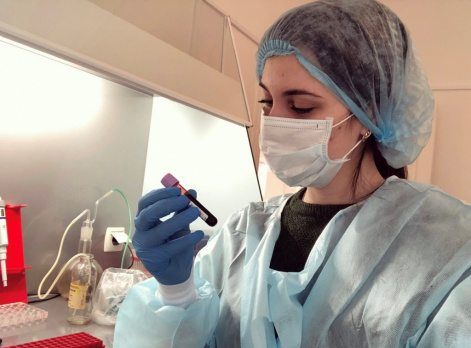Postgraduate student of KSC SB RAS investigates the genetic causes of predisposition to infectious diseases
6 November 2020 г.

What is the essence of your project?
We are studying the genetic basis of human susceptibility to infections in such an environmentally complex area as the Arctic. In recent years, in the study of the development of various human diseases, great attention has been paid to the role of congenital defects in the complex of protective proteins which destroy foreign cells. This is one of the oldest components of innate immunity. Despite the fact that the human immune system has been actively studied for many decades, it still remains a fertile object for obtaining new data. In particular, information on the genetic predisposition to the immune response to various external factors (bacteria, viruses, allergens, pollutants, etc.) is of great interest.
Our study is based on the assumption that in the course of human evolution, genotypes with low activity of the lectin pathway of activating a complex of protective proteins have been accumulated due to the widespread distribution of some intracellular infections. The lectin pathway is one of three pathways for activating immunity which does not require the participation of antibodies. We assume that isolated populations of the Taimyrsky Dolgano-Nenetsky District of the Krasnoyarsk Region encountered these infections and, thus, retained the characteristics of immunity formed at the early stages of human evolution. When implementing the project, we expect to identify a lower prevalence of certain genetic markers in the indigenous populations of the Arctic areas of the Krasnoyarsk Region.
Why is this topic relevant for the Arctic and Far North?
As the analysis of the available literature data shows, the frequency of mutations associated with congenital deficiencies of the components of the lectin pathway of activating immune defense systems has been studied neither in Russian populations, or even more so in the populations of indigenous peoples of the Russian Arctic. Earlier, at the Research Institute of Medical Problems of the North, features of the genetic regulation of proteins of the lectin pathway of the immune system activation in newborns of the Taimyr Dolgan-Nenets region were revealed. These studies are supervised by professors, Doctor of medical sciences, Sergey Tereshchenko and my scientific advisor, Candidate of biological sciences, Marina Smol’nikova.
There is now growing evidence that the lectin pathway for activating a complex of protective proteins is important in the body's response to respiratory viral infections, including the new SARS and COVID-19 coronavirus infections. This means that data on the frequencies of congenital deficiencies of the lectin pathway components in population will create a basis for clinical and genetic research in this direction. In other words, knowing certain genotypes and their combinations, it will be possible to predict the person's susceptibility to infections, as well as the course of the future disease.
The project implementation period is one year. What are the prospects for further research in this area?
We expect to obtain data which can be used to develop recommendations for health authorities regarding the prevention of infectious diseases and in order to most efficiently attract specialists to work with a high infectious load. It seems to me that the most promising of all molecular genetic research is the development of the "genetic passport" of a person. All our work is devoted to collecting data for this "passport", with the information on the origin and relationships of a person, his predisposition to the development of diseases, longevity, success in certain sports, etc. This is a task for the coming decades - each person will receive a genetic passport at birth. I hope I am to witness such a breakthrough in science to be able to apply my knowledge to its implementation.
What is your ultimate scientific goal for the coming years, what would you like to achieve?
Of course, I am planning to defend my Candidate thesis and get an academic degree. The topic of my thesis is: "Pathogenetic role of cytokine gene polymorphism and cytokine profile of exhaled air condensate in children with bronchial asthma of varying severity." There is nothing more precious in our life than children's health. I sincerely believe that the data obtained in the course of my research work will help in the fight against the development of severe forms of bronchial asthma. Another urgent task is to successfully implement our project, to obtain data in order to work out recommendations for health authorities. In the future, I would like to take part in world-class genetic and immunological congresses, start cooperation with various scientific teams and institutions, win more than one grant for the implementation of our projects and publish more than one article in world-renowned scientific journals!
Share:
